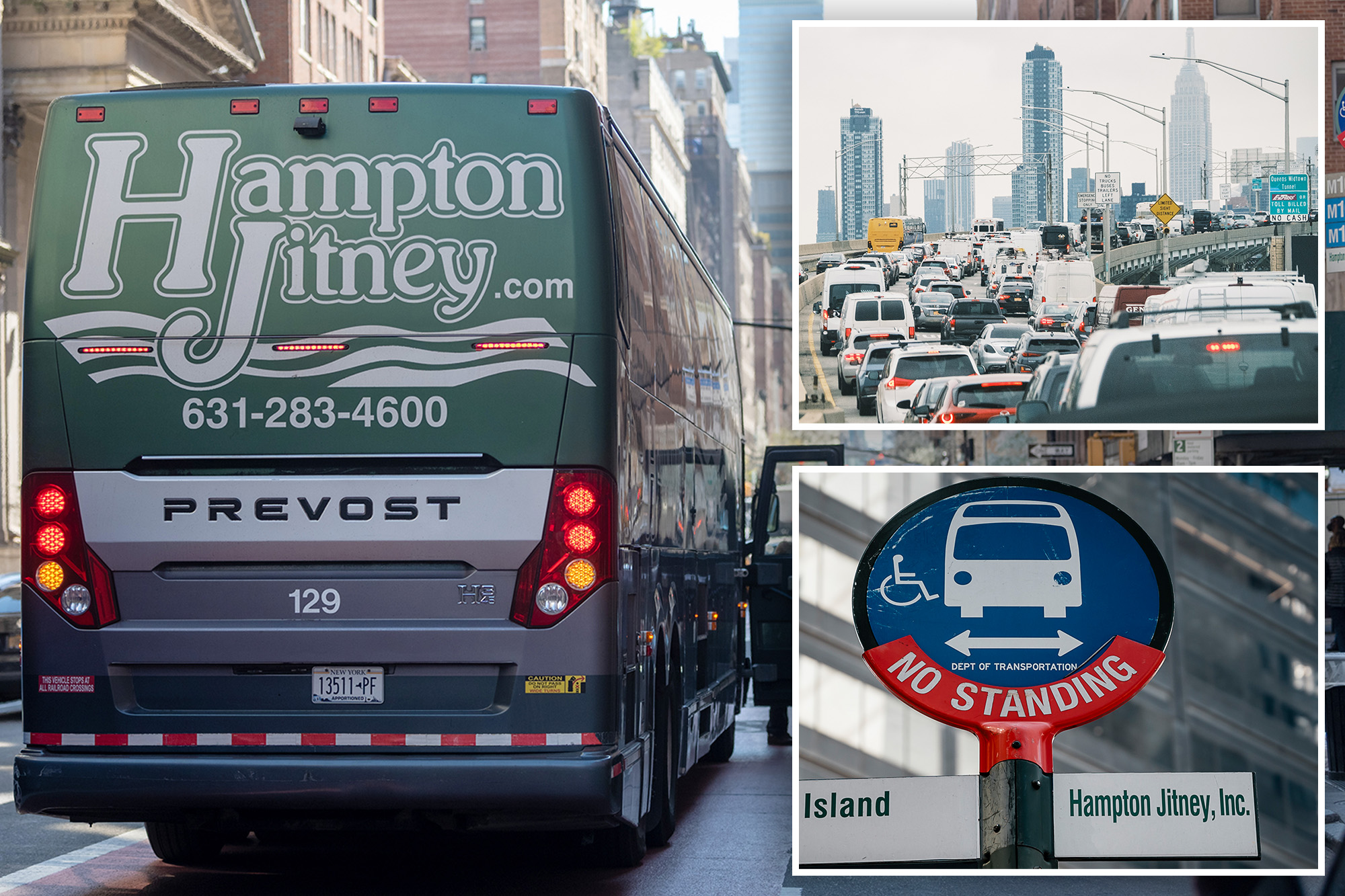- February 26, 2024
- 9 minutes read
Hampton Jitney warns of higher fares, says NYC congestion pricing will double tolls for bus operator

Hampton Jitney — the popular bus operator that shuttles New Yorkers to the Hamptons — warned that it may be forced to hike ticket prices when New York City’s imminent congestion pricing takes effect.
Under the city’s tolling proposal, the private bus company will pay double in tolls to shuttle passengers from Manhattan to the Hamptons and Long Island’s North Fork, according to an email send to riders on Feb. 25 obtained by Bloomberg.
“We are asking for help from our ridership,” Geoffrey Lynch, Hampton Jitney’s president, wrote in the email, which encouraged Hampton Jitney customers to voice support for the firm to receive an exemption from the new toll.
Under congestion pricing, Hampton Jitney buses entering Manhattan south of 60th Street will shell out a $24 fee during peak periods.
Hampton Jitney-branded buses traveling through the Queens-Midtown Tunnel — which runs under the East River and dumps vehicles out on 34th Street — will receive a $6 tunnel credit during the peak hours in question, between 5 a.m. and 9 p.m. on weekdays and from 9 a.m. to 9 p.m. on weekends.
Hampton Jitney said that come mid-June, it will be paying double in tolls because of New York City’s new congestion tolls. As a result, passengers may see ticket prices increase. Christopher Sadowski
Explore More
Still, the Queens-Midtown Tunnel also charges a toll, which is as high as $11.19 without an E-ZPass registered in New York.
The spike in toll costs for the Hampton Jitney — which is entering its 50th year of service — could trickle down to passengers, according to Bloomberg.
For reference, Jitney vehicles entered that tunnel about 20,000 times in 2023, according to Lynch’s email, per Bloomberg.
As it stands, Hampton Jitney charges $40 for a one-way prepaid ticket from New York to the Hamptons, or $47 if purchased onboard.
Pricier options to the Hamptons — where many New Yorkers escape to vacation homes — include taking an Uber or a helicopter ride, which could run for as much as $1,000 for a one-way seat, according to Bloomberg.
The Long Island Rail Road also makes trips to the affluent string of seaside destinations for $31.75 for a one-way ticket. Though it’s cheaper than the Hampton Jitney, service is more infrequent, Bloomberg reported.
The proposed congestion pricing model will charge vehicles enterine Manhattan south of 60th Street a fee during peak hours, which are between 9 a.m. to 5 p.m. on weekdays and from 9 a.m. to 9 p.m. on weekends. Stephen Yang for NY Post
Represenatives for the Hampton Jitney did not immediately respond to The Post’s request for comment.
The Metropolitan Transportation Authority is spearheading the new tolling structure, and is set to execute a final vote on the plan as early as next month, Bloomberg reported.
The city’s transit network isn’t expected to offer exemptions or discounts to the Hampton Jitney or other private bus lines, including the popular Megabus subsidiary Coach USA, which was stunned to find out that it wouldn’t be spared from the new tolls as it transports an estimated 12 million passengers into the congestion zone this year.
“It’s confounding. It. doesn’t make any sense,” Coach USA’s vice president of public affairs Dan Rodriguez told The Post on Sunday.
The MTA’s congestion pricing is set to take effect in mid-June, charging vehicles that enter Manhattan anywhere below 60th Street one per day.
Though the Hampton Jitney will receive a $6 tunnel credit for traveling thorugh the Queens-Midtown tunnel on peak hours though the tunnel also charges a toll. Getty Images
Trucks larger than a Hampton Jitney bus will be charged $36 for entering the congestion zone at peak hours, while drivers in cars will have to cough up $15.
Rideshare app-affiliated vehicles will be charged an additional $2.50 per trip if their route includes the congestion zone during the hours in question.
The transit auhority has said it anticipates as much as $1 billion in annual revenue to come from the new levies.
The MTA plans to riase $15 billion to modernize and upgrade NYC’s transit system, which is more than 100 years old, Bloomberg reported.
